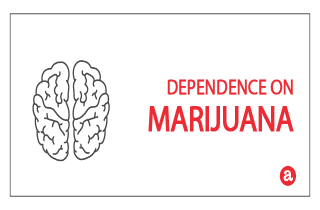Is marijuana habit forming? You bet.
Even though marijuana addictive potential is lower and THC produces physical dependence less readily than other illicit drugs, dependence on marijuana/THC still exists. Only around 9% of those who use marijuana develop dependence, however. But because so many people use marijuana, cannabis dependence is twice as prevalent as dependence on any other illicit psychoactive substance.
Drug dependence and drug addiction are terms often used interchangeably, which can cause confusion among professionals and marijuana users and contributes to misunderstanding the underlying causes of substance use. Here, we will discuss the difference between drug dependence and addiction, what to look out for and where you can find more information. Then, we invite your questions about marijuana dependence at the end.
Marijuana dependence versus addiction
According to the American Society of Addiction Medicine, there is a distinction between marijuana dependence versus addiction. In fact, not everyone who becomes dependent on marijuana or who starts developing tolerance to marijuana will become addicted to it. How is marijuana dependence different than addiction to marijuana? Addiction can be present without dependence and vice versa. The main diagnostic distinction between the two is the motivation of the individual.
Dependence refers to a state during which a person is dependent upon a drug for normal physiological functioning. Abstinence from the marijuana produces withdrawal reactions that constitute the only evidence for dependence. On the other hand, addiction refers to a behavioral syndrome where the user of marijuana becomes preoccupied to the point of obsession about obtaining more marijuana.
Dependence on marijuana symptoms
Dependence on marijuana is usually NOT associated with symptoms of physical withdrawal. However, some symptoms can involve disturbances in general bodily function such as:
- headache
- malaise
- sweating
However, more commonly marijuana dependence involves disturbances in psychological functioning, such as
- depression
- inability to concentrate
- increased anxiety
Physical dependence on marijuana
Physical dependence is a physiological state of adaptation to a drug. This means that when the effects of marijuana have worn off the body reacts by sending signals to the brain impairing a person’s ability to function normally without marijuana in their system.
Significant physical dependence on marijuana has not been demonstrated in human or animal studies. It would appear that there are normally no serious adverse physiological effects or withdrawal symptoms resulting from not using marijuana for a period of time, even after long periods of uninterrupted use. Furthermore, the majority of marijuana users take frequent breaks in their use. On one internet forum, 90% of the forum participants said they took regular breaks in use and had no or minimal withdrawal symptoms.
Psychological dependence on marijuana
Psychological dependence, often called behavioral, psychic or emotional dependence is difficult to define. But psychic dependence can be defined as a person believing they require marijuana in order to feel good or to be free of some emotional or physical pain, suggesting that dependent users set out to use marijuana for this particular purpose. Psychological dependence is said to be the reason why people continue to misuse or abuse drugs as the symptoms of withdrawal tend to stop within a few weeks of discontinuing use of a drug. It is in fact the emotional attachment, social circumstances, or perceived need to use the drug which entices people to continue with inappropriate use.
Psychological dependence on marijuana may also be defined in terms of acute “behavioral withdrawal symptoms”, for example, anxiety, restlessness, or irritability. It can also be characterized by an intense craving or compulsion to continue the use of a drug, despite that use causing a negative impact on aspects of the user’s life. Other professionals believe this description of dependence is better suited to addiction.
Marijuana dependence time: How long does it take to become dependent on marijuana?
How long it takes to become dependent on marijuana is unclear. Some studies have shown that prolonged and frequent use of marijuana could lead to dependence, however this appears to be linked to the marijuana being used in conjunction with tobacco. Studies have also revealed that marijuana smokers are more likely to develop a psychological dependence rather than a physical dependence due to the social nature of marijuana use. More research is needed to understand the impacts of marijuana use to determine marijuana dependence time.
Marijuana dependence withdrawal
Although marijuana dependence withdrawal is not as difficult as withdrawal from heroin or methamphetamine, it has been known to cause psychological disruptions. Marijuana dependence withdrawal symptoms can include:
- anxiety attacks
- depression
- excessive sweating
- insomnia
These withdrawal symptoms vary from person to person and can last anywhere from 2 days up to 2 weeks depending on the persons use patterns and if they have mixed their marijuana with tobacco or other drugs.
Marijuana dependence questions
If you still have questions about marijuana dependence, addiction or treatment options please contact us or explore other articles on this site for more information. We try to respond to all legitimate comments with a personal and prompt response.









Related Posts